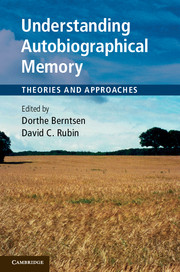Book contents
- Frontmatter
- Contents
- List of figures
- List of tables
- List of contributors
- Preface
- Acknowledgements
- 1 Introduction
- Part I Approaches to the study of autobiographical memory
- Part II Neural studies of autobiographical memory
- Part III Social and cultural aspects of autobiographical memory
- Part IV Development of autobiographical memory from infancy to old age
- 11 The life I once remembered: the waxing and waning of early memories
- 12 Subjective perspective and personal timeline in the development of autobiographical memory
- 13 Theory and research in autobiographical memory: a life-span developmental perspective
- Part V Evolution and basic processes of autobiographical memory
- Part VI Discussion
- Index
- References
12 - Subjective perspective and personal timeline in the development of autobiographical memory
Published online by Cambridge University Press: 05 November 2012
- Frontmatter
- Contents
- List of figures
- List of tables
- List of contributors
- Preface
- Acknowledgements
- 1 Introduction
- Part I Approaches to the study of autobiographical memory
- Part II Neural studies of autobiographical memory
- Part III Social and cultural aspects of autobiographical memory
- Part IV Development of autobiographical memory from infancy to old age
- 11 The life I once remembered: the waxing and waning of early memories
- 12 Subjective perspective and personal timeline in the development of autobiographical memory
- 13 Theory and research in autobiographical memory: a life-span developmental perspective
- Part V Evolution and basic processes of autobiographical memory
- Part VI Discussion
- Index
- References
Summary
I try desperately to conquer the transitory nature of my existence, to trap moments before they evanesce, to untangle the confusion of my past . . . to elucidate the ancient secrets of my childhood, to define my identity, to create my own legend. In the end, the only thing we have in abundance is the memory we have woven. (Allende, 2001, pp. 303–304)
Autobiographical memory is best defined as the construction of a coherent narrative woven from the fleeting memories of our past experiences. Through telling and sharing our stories with ourselves and others, we reconstruct and reinterpret what happened in ways that provide an evolving sense of meaning and narrative identity: who we are over time. More provocatively, although autobiographical memory is defined as memories of one’s own experiences, individual life narratives incorporate and integrate cultural interpretative frameworks. In a very real sense, autobiographical memory is memory beyond the individual to include how an individual life is understood, modulated, and transformed through socially and culturally constructed narratives.
In this chapter, I present an overview of the development of autobiographical memory from a sociocultural developmental perspective. I make two related arguments. First, I argue that the emergence of autobiographical memory during the preschool years depends on the development of a subjective perspective (what Tulving, 2002, has called autonoetic consciousness). A subjective perspective is the ability to link mental states across time to create a continuous sense of inner subjectivity (James’ [1890] stream of consciousness). Second, I argue that autobiographical memory continues to develop through middle childhood and adolescence, as individuals begin to compose a personal timeline. Personal timelines are constructed from life scripts (Berntsen and Rubin, 2004) and master narratives (McAdams, 2004) that define what a life looks like, how it should be lived, and how it should be evaluated. These life scripts and master narratives provide both structural and moral frameworks for constructing an individual life narrative in ways that produce autobiography in the true sense of the word, a biography of one’s own life interwoven with sociocultural events and the lives of others (Fivush, 2008, 2010a, 2010b). Before delving into these arguments in more detail, I first set the stage by defining autobiographical memory and providing an overview of the sociocultural theory of autobiographical memory development.
- Type
- Chapter
- Information
- Understanding Autobiographical MemoryTheories and Approaches, pp. 226 - 245Publisher: Cambridge University PressPrint publication year: 2012
References
- 12
- Cited by



